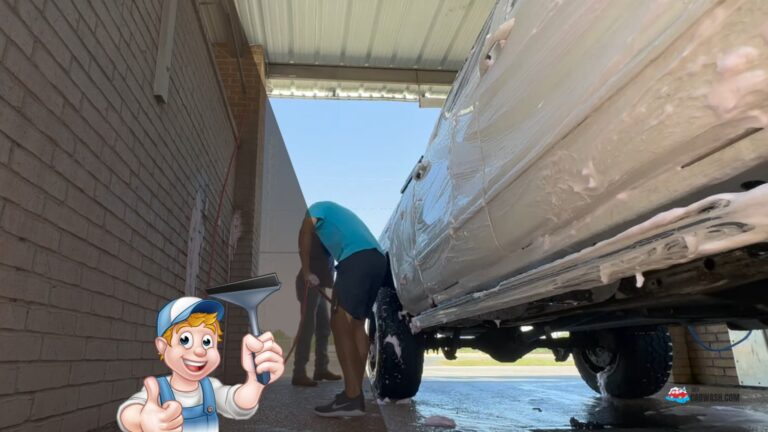Can You Wash Your Car on Townhouse Driveway?
Yes, you can wash your car on a townhouse driveway depending on local regulations and HOA rules. Some Residential areas restrict car washing due to water usage, runoff, and environmental concerns with fines between $50 to $500. Check local ordinances and HOA guidelines before washing your car.

How to Wash Your Car on Townhouse Driveway: Video Guide
To wash your car on a townhouse driveway:
- Check Local Regulations: Verify any rules from local authorities or homeowner associations regarding car washing.
- Use Eco-Friendly Products: Choose biodegradable, phosphate-free soaps to reduce environmental impact.
- Minimize Water Use: Use a bucket and a hose with a shut-off nozzle to control water flow and prevent wastage.
- Wash on a Permeable Surface: Position the car so runoff flows onto grass or gravel, not into storm drains.
- Capture Runoff: Use a mat or basin to catch soapy water, disposing of it properly afterward.
- Dry with Microfiber Towels: Use microfiber towels to dry the car and prevent water spots.
Forum Thread
Fines for Washing Your Car on Townhouse Driveway (Residential Areas)
- Water Usage Violations:
- Fines: Typically range from $50 to $500 depending on the severity and frequency of the violation.
- Penalties: Repeat offenders may face increased fines or restrictions on water usage.
- Environmental Impact Violations:
- Penalties: Mandatory environmental education programs or community service.
- Stormwater Management Violations:
- Penalties: Possible requirement to install proper drainage systems or pay for cleanup costs.
- Use of Non-Biodegradable Soaps:
- Penalties: Warnings or mandatory use of approved products.
- Homeowners Association (HOA) Rule Violations:
- Penalties: Can include additional HOA fees or restrictions on property use.
- General Non-Compliance:
- Penalties: In severe cases, misdemeanor charges or legal action may be taken.
These fines and penalties can vary significantly based on local regulations and the specific circumstances of the violation. It’s always best to check with your local authorities or HOA for the most accurate information.
Regulations and Legal Considerations for Car Washing on Townhouse Driveways
When washing a car on a townhouse driveway, Local laws and guidelines can dictate where you can wash your vehicle.
There are environmental considerations too.
1. Local Bylaws and Bans
Many towns and cities have specific bylaws regarding car washing at home.
For instance, some places ban washing cars on paved surfaces entirely. Instead, residents may be required to wash their cars on grass or gravel.
These rules aim to prevent harmful soaps and detergents from entering storm drains. If a person ignores these bylaws, they might face fines or other penalties. It’s wise to check local ordinances before washing your car.
I recommend looking up your local municipality’s website for detailed information.
2. Environmental Protection Agency (EPA) Guidelines
The EPA promotes practices that protect the environment during vehicle washing. They suggest washing cars in a way that minimizes water pollution. This includes using a commercial car wash that recycles water.
If you wash your car at home, consider using biodegradable soaps. Avoiding soaps that contain phosphates can lessen the impact on local waterways. It helps to rinse your vehicle quickly to reduce runoff.
Consequences of Illegal Car Washing in Townhouse Driveway
Some areas impose fines as high as $500 for illegal car washing. Besides fines, there is a risk of creating pollution that can harm local wildlife and water quality.
Local authorities may issue warnings before imposing fines. Continual violations can lead to increased penalties or legal actions.
If a neighbor reports illegal washing, it can escalate into more significant issues.
Best Practices for Eco-Friendly Car Washing at Home
Here are some best practices for eco-friendly car washing at home:
- Use a Bucket and Hose with a Nozzle: Use a bucket for soapy water and a hose with an automatic shut-off nozzle to reduce water waste.
- Choose Biodegradable Soaps: Use eco-friendly, biodegradable car wash soaps to minimize harmful chemicals in runoff.
- Wash on Grass or Gravel: Wash your car on grass or gravel to filter runoff and prevent pollutants from entering storm drains.
- Minimize Water Usage: Use a waterless car wash product or a rinse-free wash solution to conserve water.
- Recycle Water: Collect rinse water in a bucket and reuse it for rinsing wheels or initial rinsing.
I recommend using biodegradable soaps that don’t contain harmful chemicals. Many traditional car wash soaps have ingredients that can harm aquatic life when they enter the water system.
Look for labels that say “non-toxic” and “biodegradable.”
Use a spray nozzle with a shut-off feature to control water flow and use only what is needed.
According to studies, washing a car with a bucket and sponge can use as little as 20-30 gallons of water, compared to 100 gallons or more with a hose.
Preventing Pollution from Soapy Water
- Wash on a Permeable Surface: Wash your car on grass, gravel, or dirt to allow soapy water to filter naturally into the ground, reducing runoff into storm drains.
- Use Biodegradable Soap: Choose environmentally friendly, biodegradable soaps that break down safely without harming aquatic life.
- Use a Minimal Amount of Soap: Dilute soap properly and use only as much as needed to minimize chemical concentration in the water.
- Collect Runoff: Use a bucket or place a catch basin under the car to collect soapy water, and dispose of it properly in a sanitary sewer, not a storm drain.
- Try a Waterless Wash: Opt for a waterless car wash solution to eliminate runoff altogether.
I always wash my car on a grassy area rather than on pavement. The grass can absorb excess water, filtering out some pollutants before the water reaches the drain.
Please do not wash your car when it’s raining or when the ground is saturated, as runoff can be more significant during these times and pollute the ground and nearby water sources.
Alternate Options for Townhouse Driveway Car Wash
Here are some alternative options for washing your car if you can’t do it on your townhouse driveway:
- Self-Service Car Wash: Use a nearby self-service car wash where you can control water usage and use eco-friendly cleaning products.
- Waterless Car Wash Products: Opt for waterless or rinse-free car wash products that require minimal water and can be used anywhere.
- Professional Eco-Friendly Car Wash: Choose a professional car wash that uses water recycling systems and eco-friendly soaps.
- Mobile Car Wash Services: Hire a mobile car wash service that uses minimal water and biodegradable cleaning products.
- Community Car Wash Area: Check if your community has a designated car wash area with proper drainage and environmental safeguards.
Mobile Detailing Services
You can find services that come directly to my home or workplace. They use professional-grade products and techniques, which often yield better results than a DIY approach.
Look for companies with positive ratings and reviews and check their social media profiles for reviews of real customers.
Public Carwash Sites
Public car wash sites are another excellent option.
Many of these facilities offer automatic washes that are quick and efficient – choose from basic washes to more comprehensive packages that include waxing and undercarriage cleaning.
Rain Natural Washing
Rainwater is typically softer than tap water, which means it can help wash away dirt without leaving spots.
Lightly rinse your vehicle if you are anticipating rain. After the rain, a quick wipe-down can help remove any stubborn residues that might remain.
This method is eco-friendly and cost-effective too.
Are there regulations on washing my car in a residential driveway?
Yes, many cities have specific regulations about washing cars in residential areas.
Yes, there are regulations on washing your car in a residential driveway, and they can vary depending on your location. Here are some common regulations you might encounter:
- Water Usage Restrictions: During drought conditions, some areas may restrict or prohibit the use of water for car washing to conserve water.
- Environmental Impact: Runoff from car washing can contain pollutants like oil, grease, and heavy metals, which can harm local waterways. Some regions have regulations to prevent this pollution.
- Stormwater Management: Many cities have ordinances that prohibit washing cars on impervious surfaces like driveways because the runoff can carry pollutants into storm drains.
- Use of Biodegradable Soaps: You may be required to use biodegradable soaps to minimize environmental impact.
- Homeowners Association (HOA) Rules: If you live in a community with an HOA, there may be specific rules about car washing to maintain the neighborhood’s appearance and prevent water waste.
- Fines and Penalties: Violating these regulations can result in fines ranging from $50 to $500, and in some cases, even misdemeanor charges.
Could homeowner association rules restrict driveway car cleaning activities?
Yes, Homeowner associations (HOAs) can have their own rules regarding washing cars. Some may not allow it at all to maintain a certain appearance in the community.
I suggest reviewing the HOA guidelines or speaking with an HOA representative to ensure compliance.
How do state-specific laws affect driveway car-washing practices?
State laws vary widely, affecting where and how I can wash my car. Some states may have stricter laws about water use or contaminants.
Check for your state regulations if you want to wash your car in the driveway.
Using certain chemical cleaners can lead to fines.
Many areas restrict the use of pollutants that harm the environment.
Is it permissible to wash my vehicle in the driveway with water restrictions in place?
Water restrictions happen for a reason and it often is due to water scarcity and thus limit the ability to wash cars.
Many municipalities recommend using commercial car washes during these times, as they often recycle water.
If there are restrictions where you live, you need to follow those guidelines closely.






